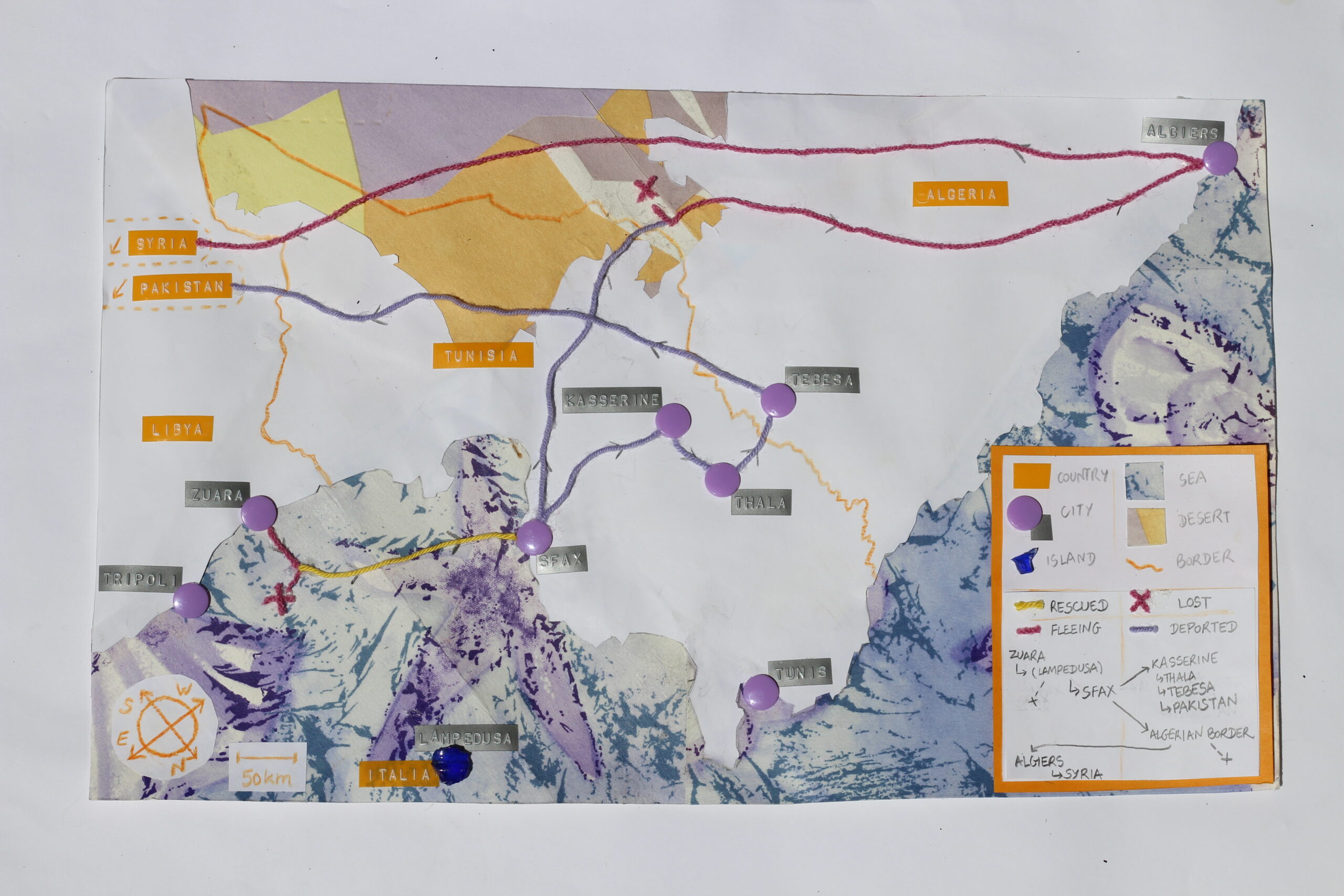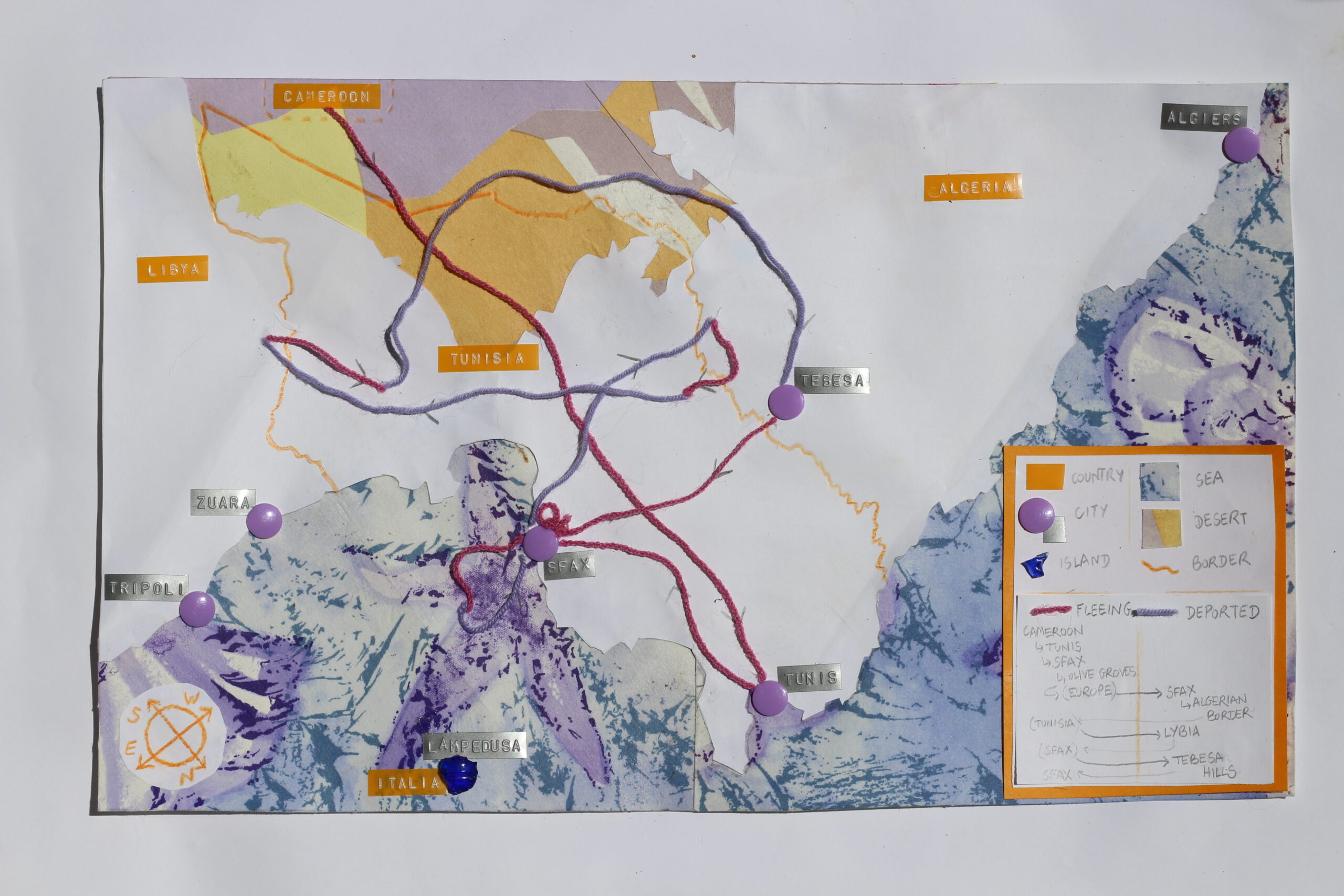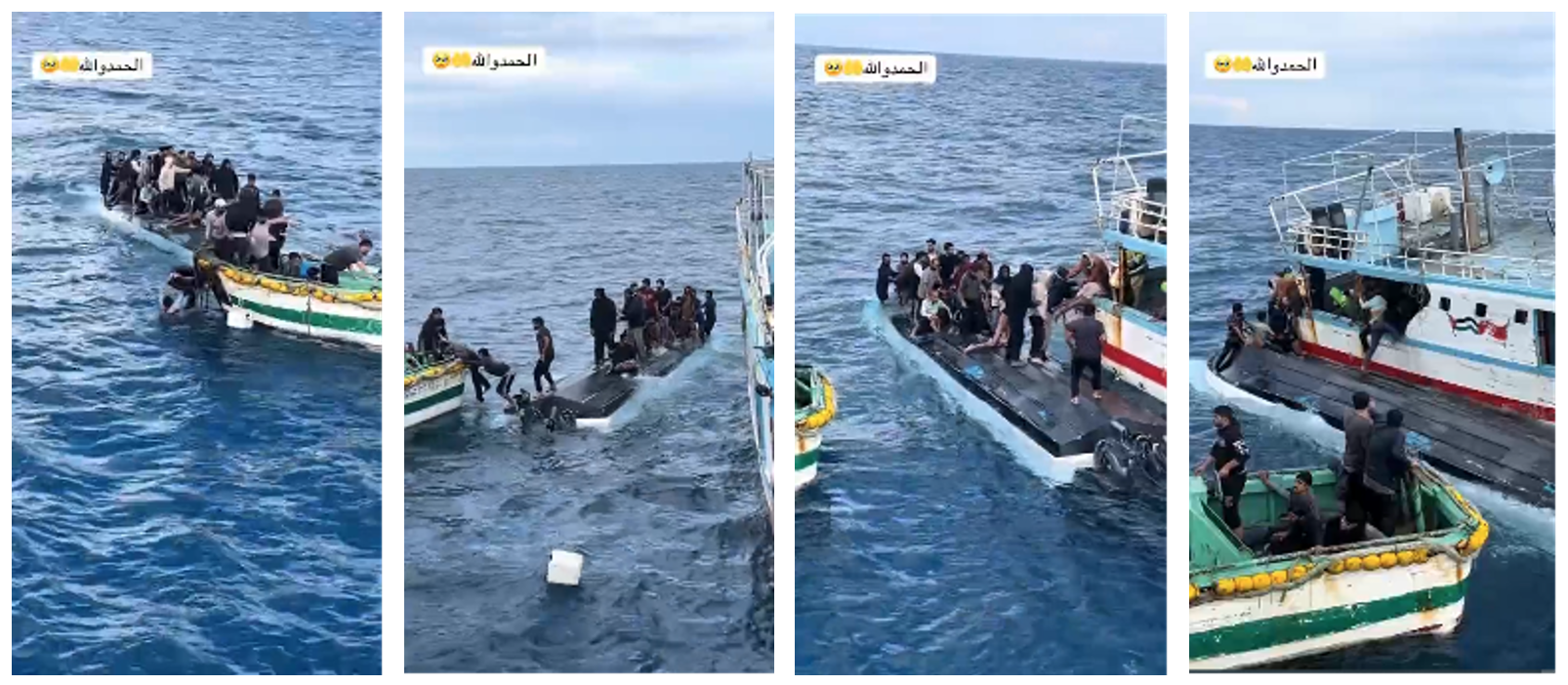During Spring 2025, at a moment when the Tunisian government once again escalated violence against Black people on the move, we were already again and again alarmed by reports of deportations to the deserts, resulting in death or disappearance.
Deportation after shipwreck

Journey according to the testimony given. Photo: Alarm Phone
On the last afternoon of 2024, we were informed about a boat in distress with around 60 men on board. They departed 31 December from Zuwara towards Lampedusa, but soon after encountered engine failure. Mohammad, a close ally of Alarm phone and part of a Syrian network that supports people in distress at sea, recounts the events:
“As this new year began, we had already witnessed way too many disasters in the Mediterranean Sea due to the policies of closed borders, prevailing racism, and the failure of authorities to fulfill their responsibilities. Today, I recall an incident that occurred on December 31, which claimed the lives of 16 migrants. As on many days, I received a call from people in distress at sea. It was at 8:00 a.m., my phone rang. The caller said, “Hello,” and I replied, “Hello, what can I do for you?” He started to explain their situation, but the call was suddenly cut off due to interference.
Before the line disconnected, he told me that one of their boat’s engines had failed, but the other was still functioning. I tried calling back several times to no avail. In close collaboration with the Alarm Phone, we worked tirelessly for hours trying to locate them. Meanwhile, calls from their families started pouring in, with heartbreaking questions: “Did something bad happen? Or have they arrived safely?” I had no answers.
One mother said to me, “Tell me, my son, did they drown?” Her voice carried a sense of certainty, as if she already knew the truth without anyone telling her. Yes, the boat, carrying approximately 60 people, had sunk.
Later, I received a call from a fisherman who told me he had rescued some survivors and brought them to Tunisia. However, the authorities there had treated them as usual and deported them to the desert on the Algerian border. They walked for 10 hours in the desert without food or water before they found someone who helped them.
Later, the people called me again to inform me they had finally reached Algiers after an exhausting journey. But the tragedy did not end there. They explained that the original group had been divided during the ordeal, and some were still lost in the desert. They had also lost a friend in the sea, whose full name and family details remain unknown.
We tried urging the authorities to act, but no one did anything. They left the people to die at sea or in the desert.
I hope the struggle continues and that the number of those fighting for justice and humanity at sea grows. The killing at the borders has to have an end! And all people need free and safe routes to travel.”
Screenshots of a video showing the difficult rescue from the capsized boat by fisherman. Video provided to AP by a relative of people on board.
Despite our alert to both European and Tunisian authorities, the rescue of the shipwrecked people was done by Tunisian fishermen who by luck were in the area. Tragically, for 16 people rescue for them was to late.
When they were once again on land, the Tunisian authorities decided to deport the survivors to the desert and in doing so expose them again to death.
One of the smaller groups was pushed to the deserted broder region with Algeria. Able to speak Arabic and being young and healthy, they managed to reach Algiers. After the ordeals suffered at Europe’s externalized borders, they decided to return to Syria.
Another survivor disappeared after the rescue to Sfax. After weeks of search by his brother, he gave a sign from a prison in Tebesa, at the Algerian side of the border with Tunisia. He ended up there after being brought by bus to Kasserine, then Thala and afterwards was pushed across the border. In the prison he was detained along with 35 other people, at least two of whom were minors. Others reported that had been there as long as five or six months.
At the end of April, he was deported from Algeria to Pakistan by plane with other people from Pakistan.
Multiple deportations leading to the death of baby Elian Michel

Journey according to the testimony given. Photo: Alarm Phone
In February, Alarm Phone was contacted by a mother who lost her 3 month old baby after multiple deportations in border areas following her and her husband’s interception at sea by the Tunisian coast guard:
“My name is S., I am Cameroonian. I left my country two years ago. I was in a relationship at the time with my current husband, but as students we didn’t have much money, so my parents wanted to force me to get married. It was to escape this forced marriage that I had to flee my country.
My husband and I arrived in Tunisia at the end of 2023 with the idea of settling there and starting a new life. We knew that the situation was difficult in the country, but we couldn’t imagine that the living conditions were so tough. We first lived in Tunis for two months. We shared a flat with other people and worked to pay the rent. But very quickly the situation deteriorated: racism was everywhere and more and more people we knew were being arrested and thrown in prison. This happened to people who had papers. Many disappeared after being deported to the desert.
In the winter of 2024 we left for Sfax to try to escape the increasing number of arrests. When we arrived, we found a small place to rent. Unfortunately, after a few weeks, our tenant came under pressure from the national guard to evict us and we had to leave. We then went to live outside Sfax, in the olive groves. The camps are regularly destroyed by law enforcement, and we had to move on.
Living conditions in the fields are very basic: people live in shelters made of plastic waste and wood. It’s very cold, but it provides some protection. There is no access to running water. Sometimes locals come to sell cans to us. There are also farmers who are supportive and when they come to water their fields they let us use their tanks. But that water is not drinkable and we still had to buy extra bottles. My husband found a small night job which allowed him to earn a little money. That’s what made us able to buy food.
Conditions are so difficult and arrests so frequent that we decided to flee Tunisia, especially since I had just had a baby with my husband: little Elian Michel. In early February 2025, we set off on a metal boat towards Europe. The boat was very crowded and unstable (there were 47 of us), but it was moving along well. In the early morning, after a few hours of sailing, when we were in international waters, the national guard found us. They asked us to turn off the engine, threatening to sink us if we refused. We complied immediately because we were too afraid that they would make waves that would cause us to capsize.
They were coast guards on jet skis who spotted us first and then called two large boats from the national guard, which arrived shortly after. They separated us into two groups, each on a boat, before disembarking us in the port of Sfax. We were all wet and shivering with cold, but they gave us no blankets, water or food. As I had left the baby’s milk on the boat, I asked the national guard officer to go and buy some at the pharmacy. But he replied that it wasn’t allowed. Yet he saw that my baby was very small, that he was only two and a half months old and that he was all wet… he wouldn’t listen to me despite my pleas. All day long we were locked up in the port, on the ground. Two pregnant women fainted and had to be taken to hospital. But nobody did anything for my baby.
At the end of the day, other police officers arrived. They handcuffed us all. My hands were tied behind my back and my baby was on my chest, I couldn’t touch him anymore. They made us get on a bus. A few other people joined us on the bus: they were other black people that the national guard had arrested and put in prison. We were handcuffed on the bus for 5 hours. There was a driver and 4 other policemen who were responsible for searching us during the journey. Those who protested were beaten. We still hadn’t been given anything to eat or drink. Other National Guard vehicles were following the bus.
When the bus stopped it was dark. The police officers made us get off one by one. There were four cars with about fifteen heavily armed police officers. They took off our handcuffs, made us walk for a kilometer before asking us to walk straight ahead without looking back. Thanks to someone who had managed to keep his cell phone, we realized that we were at the Algerian border. We split into two groups: some wanted to take refuge in Algeria, but my husband and I wanted to get closer to a town as quickly as possible so that we could buy food for our baby, which is why we joined the group that wanted to return to Tunisia.
So we walked through the night with about fifteen other people. A brother gave me some water for my baby, but I could tell he was very weak. In the middle of the night, our group was spotted by the national guard. Everyone was caught, beaten and probably deported again, except for the three of us who had managed to hide. In the early morning, we arrived at a date plantation near a village. There was an old man there who decided to help us when he saw us. He called someone who went to buy milk, a feeding bottle and some food for us. We ate, we rested and at the end of the day, we decided to set off again. We wanted to walk at night because we knew that during the day there was too much risk of being spotted: if someone sees you, they often call the police directly…
After walking for two days, we arrived in a slightly larger town, but someone must have reported us because the police came and arrested us. We were once again transported by car for many hours. We realized that the national guard was taking us to Libya. It was dark when they made us get out of the car. The Libyans were waiting for us a few meters away. Other people were being deported at the same time as us. Luckily, we managed to hide in a kind of large pipe that was nearby. The Libyans searched for us for a while but, thank God, they didn’t find us.
Once again we walked through the night, hoping to find a village on the Tunisian side. We met a man who decided to help us. He called his son, who took us to a station so that we could return to Sfax. But once again the police stopped us. This time, we were deported to the Algerian border, in the hills near Tebessa. After a week of wandering in the hills, we managed to convince a local to take us back to Sfax for a fee. And so, after a month in the desert, we returned to the olive groves. We found that our shelter had been destroyed, so we went to set up camp a little further on.
As my baby wasn’t well, I went to see an African sister who was a nurse back home. She examined my son and told me that he probably had hypothermia. Unfortunately, we didn’t have time to do anything. I put him to bed that night, all wrapped up warm. He never woke up. My husband and I cried a lot; we were in shock. One of the community leaders of the camp came to see us and told us that he was going to inform the national guard of the death. The National Guard came to collect my husband and the baby’s body. They went to the hospital where a doctor pronounced the death. The police took my husband back to the camp: he wanted to keep the body with him, but they refused and told him to leave the body in the pickup truck.
I don’t know if my baby was buried and what happened to the body. As a grieving mother, it is important for me to know where the body is and to be able to say goodbye to him. It’s a very difficult situation. In addition to this loss, there is the very complicated situation we are in in Tunisia, because of racism and constant arrests and deportations. We cannot stay in Tunisia. We have no choice but to try to flee this country again.”
These are just two testimonies that describe the inhuman situation of migrants in Tunisia, Libya and Algeria, where their lives don’t count and they are abandoned.
The testimonies presented in this report lay bare the brutal consequences of a transnational deportation regime that systematically devalues Black lives on the move. The chain of events—from sea interceptions to desert abandonments and cross-border expulsions—reveals a deliberate policy of deterrence through suffering. Tunisia, with both tacit and overt support of European actors, is enacting practices that expose migrants not only to repeated violations of their basic rights but also to the imminent risk of death.
These stories are not isolated. They reflect a pattern: shipwreck survivors being deported to the desert; families suffering devastating loss after multiple forced displacements; individuals disappearing across borders, detained indefinitely or vanishing without a trace.
This system of externalized border enforcement does not stop at physical boundaries—it stretches into lives, tearing families apart, erasing futures, and deepening the violence of racialized migration control. The border regime has found yet another way to instrumentalize the deadly environment, putting people to death both at sea and in deserted regions. The tragic outcomes are not accidents. They are the foreseeable, preventable results of EU-led policies crafted to fortify borders, regardless of the human cost.
With Alarm Phone, we mourn those deaths and echo the call of those resisting these injustices: The killing at the borders must end, freedom of movement for all!
